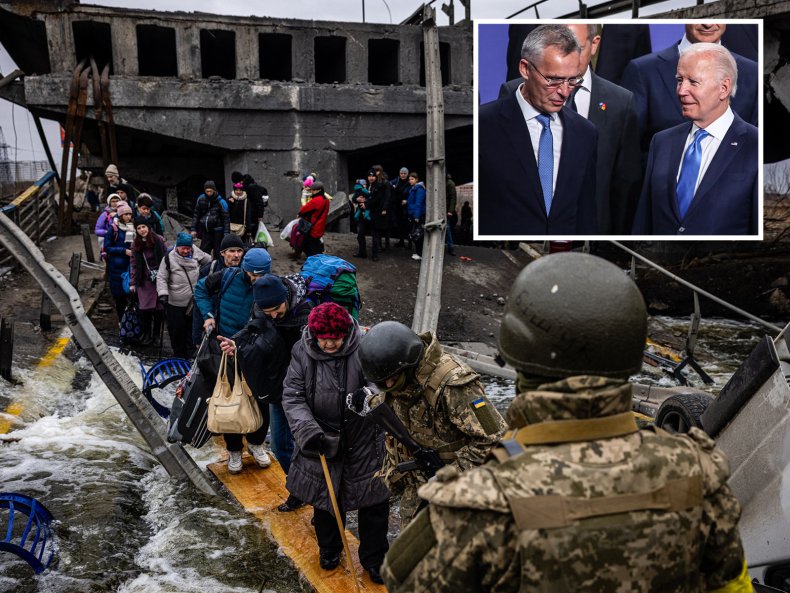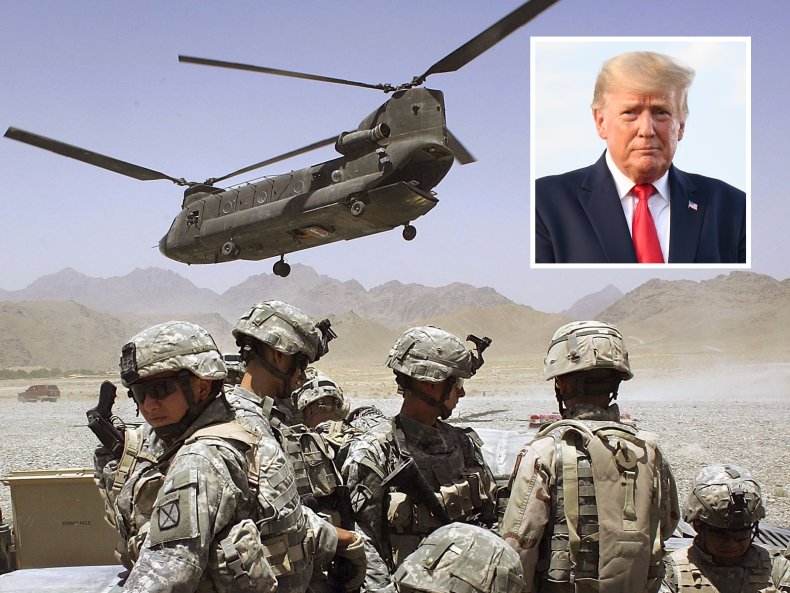JALEN SMALL
Top national security experts now predict that the war in Ukraine will go on longer than first anticipated.
"A war Vladimir Putin thought would be over in a matter of days has now stretched on for months," U.S. Secretary of State Antony Blinken said during a press conference in Berlin on Sunday.
The Secretary-General of NATO, Jens Stoltenberg, shared a similar assessment earlier this month, when he told the Washington Post that the fighting could easily drag into an "unresolved conflict," with neither side willing to make the concessions necessary for any deal.
"We need to be prepared that this may actually drag on for a long time," he said.
 U.S. popular support for Ukraine Aid declines amid ongoing economic woesI. n this combination image, Evacuees cross a destroyed bridge as they flee the city of Irpin, northwest of Kyiv, on March 7, 2022. - Ukraine dismissed Moscow's offer to set up humanitarian corridors from several bombarded cities on Monday after it emerged some routes would lead refugees into Russia or Belarus. and Jens Stoltenberg and Joe Biden (Inset) at the Nato summit in Madrid, Spain, on Wednesday, June 29, 2022.GETTY
U.S. popular support for Ukraine Aid declines amid ongoing economic woesI. n this combination image, Evacuees cross a destroyed bridge as they flee the city of Irpin, northwest of Kyiv, on March 7, 2022. - Ukraine dismissed Moscow's offer to set up humanitarian corridors from several bombarded cities on Monday after it emerged some routes would lead refugees into Russia or Belarus. and Jens Stoltenberg and Joe Biden (Inset) at the Nato summit in Madrid, Spain, on Wednesday, June 29, 2022.GETTYWhile governments have committed to supporting Ukraine until diplomatic terms can be negotiated, the domestic politics of an extended war are less straightforward.
And as the war reaches its 125th day, polls suggest that Americans are growing anxious about the its rising costs.
The Devex Funding Platform found that the U.S. and other foreign governments gave more than $100 billion in economic and military aid to Ukraine between February 24 and June 7. Data from the Kiel Institute for the World Economy reveals that the U.S. has given more than all other donor nations and institutions combined.
But considering the rising inflation and political uncertainty at home, Bruce Stokes, Visiting Senior Fellow at the German Marshall Fund of the United States, said the European experts he has spoken with are worried that both American and European resolve to support Ukraine will eventually waver.
"Europeans are asking questions about America's steadfastness and their own," he told Newsweek. "There seems to be an uncertainty about America's political system, which might translate into uncertainty about America's role in Ukraine."
Polling data from the Morning Consult suggests that American support for financial assistance to Ukraine has already atrophied.
Some 86% of American voters are at least somewhat concerned about Russia's invasion of Ukraine, according to the Russia-Ukraine Crisis Tracker. However, only 46% of American voters currently agree that the government should impose sanctions on Russia, even if it causes the price of goods to rise — down from the 56% who agreed with the statement in April.
Data also showed that for the fourth straight week, the share of U.S. voters who say their government should impose sanctions on Russian oil and natural gas, even if it causes energy prices to rise, are now in the minority, down from a high of 55% in April to just 46% this week.
Compared to Democrats, approval for these policies among Republicans is even lower. While 55% of Democrats support it, only 39% of Republicans support sanctions regardless of the rising prices of goods. And while 55% of Democrats support sanctions despite rising gas prices, just 42% of Republicans feel the same way.
These disparities may speak to the rising power of what Senate Minority Leader Mitch McConnel has dubbed "isolationist sentiment" in the party.
Despite his public statements, the share of Republican voters who say the United States is doing "too much" to halt Russia's invasion of Ukraine has increased, from 13% in March to 23% in the latest survey.
And while it received unanimous support from Democrats, 57 Republicans in the House and 11 in the Senate voted against the Additional Ukraine Supplemental Appropriations Act in May, which eventually passed, to deliver $40 billion in aid to Ukraine.
On the international stage, Biden officials have tried to assuage fears about wavering domestic support.
After the U.S. Department of Defense announced $450 million more in military aid on Thursday, bringing total U.S. security assistance during this conflict to $6.1 billion, Secretary of State Antony Blinken reaffirmed the country's commitment to Ukraine.
"We are giving Ukraine the support it needs to defend itself for as long as it takes, and we will continue to do so," he said.
But while officials assert these commitments, Stokes points out that Biden's foreign policy decisions and his handling of the economy will be judged on the ballot during the upcoming midterm elections in November.
And with Biden's current approval ratings at a term-low 36%, he added that there is some reason for European allies to doubt the ability of the U.S. to follow through on certain long-term commitments.
Only 21% of Americans have a "great deal" of confidence in Joe Biden's ability to handle the situation in Ukraine, according to an A.P. poll conducted in May. That percentage falls to just 2% among Republicans.
Citing public opinion data from the U.S., Stokes said, "there is evidence that a portion of the American public is saying, 'we support what we are doing in Ukraine,' but there's also some hesitancy emerging about how much more we should do."
Former President Donald Trump, who repeatedly criticized NATO throughout his presidency, is helping to stoke some of this disapproval.
At his Save America rally in Illinois on Saturday, he criticized Biden's foreign policy strategy and described America as a once-great nation.
"Two years ago, it was the greatest nation in the world," he told the crowd. "But it is no longer a great nation; it is a nation in decline. It is no longer energy independent or energy dominant like it was just two years ago."
"It surrendered in Afghanistan, and it allowed Russia to devastate a country (Ukraine), killing hundreds of thousands of people. It will only get worse," he later warned, adding, "It would never have happened with me."
 In this combinatiom image, American soldiers from the 10th Mountain Division deploy to fight Taliban fighters as part of Operation Mountain Thrust to a U.S. base near the village of Deh Afghan on June 22, 2006 in the Zabul province of Afghanistan and Donald Trump (Inset) arrives to give remarks during a Save America Rally with former US President Donald Trump at the Adams County Fairgrounds on June 25, 2022 in Mendon, Illinois.
In this combinatiom image, American soldiers from the 10th Mountain Division deploy to fight Taliban fighters as part of Operation Mountain Thrust to a U.S. base near the village of Deh Afghan on June 22, 2006 in the Zabul province of Afghanistan and Donald Trump (Inset) arrives to give remarks during a Save America Rally with former US President Donald Trump at the Adams County Fairgrounds on June 25, 2022 in Mendon, Illinois.Stokes said these intensifying attacks from some Republicans, combined with low approval ratings and rising inflation, bring uncertainty to Biden's foreign policy strategy in the future.
"Trump raised serious doubts in Europeans minds about whether they could trust the United States going forward," he told Newsweek.
"What Europeans fear is that America will one day say, 'The war is over, we are going to pivot back to Asia, this is your problem, and go rebuild Ukraine,''' he said.
"So I think that one should worry about, not only declining support for the war now, but whether the support would be there to rebuild Ukraine, assuming we get the opportunity to do so," he added.
No comments:
Post a Comment